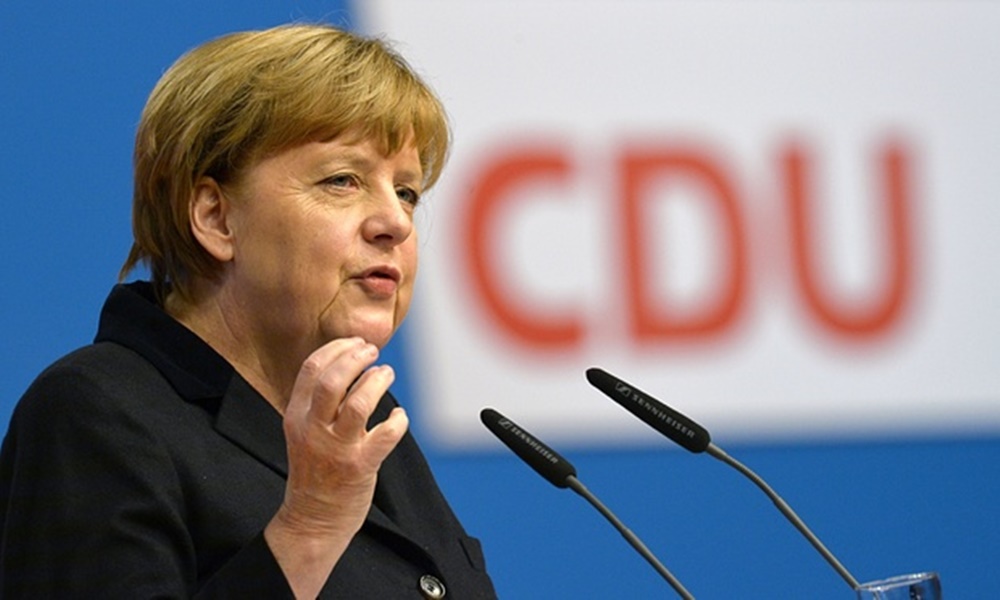German Chancellor Angela Merkel's conservative Christian Democrats delivered a crushing blow to her centre-left rivals in a bellwether state election yesterday.
The CDU secured 33.5 percent of the vote in the western rust-belt region of North Rhine Westphalia, the most populous state in the country, according to an exit poll by public broadcaster ZDF.
Yesterday's vote saw Merkel's party seize the state from the Social Democrat (SPD) opposition and delivered her fresh momentum as she gears up to make her bid for a fourth term as leader of Europe''s biggest economy in September''s national election.
Her party had already scored victories in two other recent state elections - the small industrial state of Saarland and the northern coastal region of Schleswig Holstein.
The North Rhine Westphalia result brought to an end the SPD government led by state Premier Hannelore Kraft, who stepped down both as state leader and as state party chief.
The SPD vote slumped from 39.1 percent in the last election in 2012 to just 31.1 percent yesterday. About 13 million of North Rhine Westphalia''s 18 million residents were eligible to vote, representing more than one-fifth of the total national electorate.
 The CDU is hoping to mount a national campaign in September built around Merkel (photo), who has been in office since 2005, as a force of political stability and a steady hand on the global stage.
The CDU is hoping to mount a national campaign in September built around Merkel (photo), who has been in office since 2005, as a force of political stability and a steady hand on the global stage.
"We are going very, very confidently with a tailwind into the Bundestag election," said Michael Grosse-Broemer, a national parliamentary leader of Merkel's Christian Democrats.
The SPD's defeat in North Rhine Westphalia strikes a major blow to the party and its candidate for chancellor, the former European Parliament president Martin Schulz.
Schulz admits to 'a crushing defeat'
A crestfallen Schulz described on German public TV the outcome as "a crushing defeat". Ahead of the vote Schulz had linked victory in the state to winning power in Berlin later this year. He insisted, however, that the national election was still some time off.
"I'm an experienced election fighter," he declared.The loss is also a personal setback for Schulz as North Rhine Westphalia is his home state and where he served in municipal politics.
Political scientist Oskar Niedermayer told dpa before the state election that if the SPD came in second, then Schulz "can bury his hopes for being chancellor". Home to Germany's Ruhr region of industry and coal mining, as well as several of the nation's biggest cities, North Rhine Westphalia is considered to be an SPD stronghold.
The party has led governments in the state for 45 of the past 50 years. Opinion polls had also consistently shown the state's premier, Hannelore Kraft, as more popular that her conservative challenger Armin Laschet.
The 55-year-old Kraft has regularly batted away pleas over the years from her party to take over as national leader from Merkel. But overshadowing Kraft's campaign for yesterday's election has been criticism of her government's handling of the 2016 New Year's Eve attacks on women in Cologne, as well a December terrorist attack on a Berlin Christmas market that was carried out by a one-time resident of North Rhine Westphalia.
This gave Laschet the chance to stake out the high ground on issues such as security, terrorism and economic uncertainty.
Yesterday's result could now pave the way for the state's first ever coalition between the CDU and the SPD under the 56-year-old Laschet. Another option for Laschet is a tie-up with his party's traditional allies, the pro-business Free Democrats (FDP), a coalition which would have a thin parliamentary majority.
The prospects of a CDU-FDP coalition have increased after the hard-left Die Linke failed yesterday to garner the necessary five percent of the vote to enter the state Parliament.
FDP leader Christian Lindner seized on the party's 12.1 percent vote as signalling its comeback after the party was bounced out of the federal Parliament in Berlin following the last national poll in 2013.
Yesterday's poll also represented a key test of the right-wing populist Alternative for Germany (AfD), whose support has been hit by an acrimonious internal power struggle and Merkel's efforts to defuse the refugee crisis.
The AfD secured 7.6 percent of the vote yesterday, meaning the party is now represented in 13 of Germany’s parliaments. But the result was well short of its own ambitions to emerge as the third political force in North Rhine Westphalia.
Yesterday's poll was a disaster for Kraft's coalition partner, the environmental Greens, which garnered just 6.1 percent of the vote, down from 11.3 percent in the last election in 2012.
- dpa

